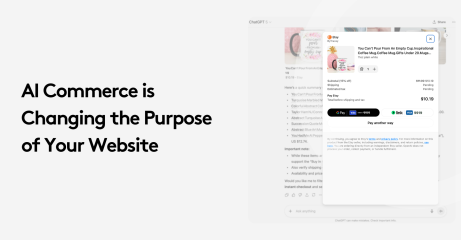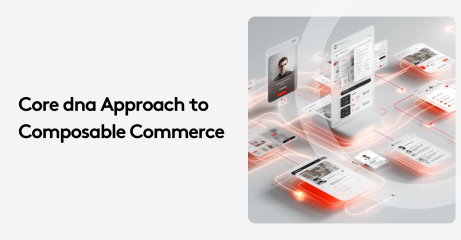2025 Guide to Choosing the Best Enterprise eCommerce Platforms
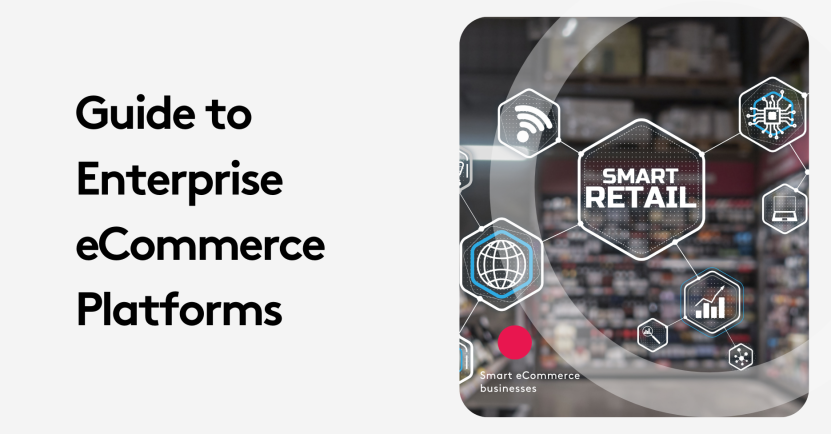
“We see our customers as invited guests to a party, and we are the hosts. It’s our job every day to make every important aspect of the customer experience a little bit better.” – Jeff Bezos, founder and executive chairman of Amazon.
Are you making 2025 the year you upgrade your eCommerce platform? If yes, this is for you.
We have put together a detailed guide to choosing the best enterprise eCommerce platform in 2025 and beyond. We are sure you are aware if the impact of choosing the right ecom platform - It will directly impact revenue, operation and growth.
In 2025, an enterprise eCommerce solution should be scalable and function as a whole. From inventory management to customer relationship management, it should be customizable to fit the company's needs.
More often than not, your online business growth is impacted by the performance of your eCommerce platform. If your eCommerce solution is not delivering, it's time to start evaluating other routes.
So, what does innovative enterprise-level eCommerce software look like, and what can it do for you?
Let’s explore what the leading eCommerce platforms in 2025 are doing and how they’re tackling current and emerging trends.
On this page:
Key Features for Enterprise eCommerce Platforms in 2025
All eCommerce platforms will vary to some extent. Providers want to set themselves apart and potentially market to different sectors.
However, there are some core components of a comprehensive eCommerce suite that you can expect from any major provider. Here’s a non-exhaustive list of some common, and arguably necessary, eCommerce platform features:
- Store Management System: This is a centralized interface where employees can oversee and manage product sales, order processing, and returns.
- Payment Gateway: A point-of-sale system for digital transactions, this facilitates payments along with taxes and fees, currency conversion, and credit card validation.
- Shopping Carts and Wish Lists: Shopping carts are a staple of the online shopping experience, while wish lists encourage future sales and user collaboration.
- Customer Accounts and Profiles: To encourage brand loyalty and repeat business, a user profile adds personalization and allows for recommended products.
- SEO and Marketing Tools: Search engine optimization (SEO) is a must-have for any online business, and eCommerce solutions should have a built-in way for businesses to easily showcase and market the content on their site.
When it comes to enterprise eCommerce platforms operating at scale, these features are only the beginning.
To keep pace in today’s world of big data and metrics, businesses need to analyze customer behavior and act on the findings to maximize sales. Enterprise businesses need a more robust platform, which includes the following features:
- Scalability and Performance: As a business grows, its website needs to accommodate increasing user activity without compromising the user experience.
- Customization and Flexibility: Enterprise-level eCommerce looks different across business size, model, and target demographics; the platform’s features should be customizable to meet each business’s needs — as well as the needs of their customers.
- Security and Compliance: It only takes one major security breach to lose trust with customers. Secure eCommerce platforms should leverage cybersecurity best practices and compliance to protect business and user data.
- Integration Capabilities: Streamlined integration with other tech platforms allows businesses more flexibility in their tools, features, and workflow solutions.
- User Experience and Design: The user journey begins and ends with a business’s user interface (UI) and overall user experience (UX). The design should make that journey seamless, efficient, and enjoyable for all users.
When working with an enterprise eCommerce provider, make sure that each of these features meets your expectations and the needs of your business.
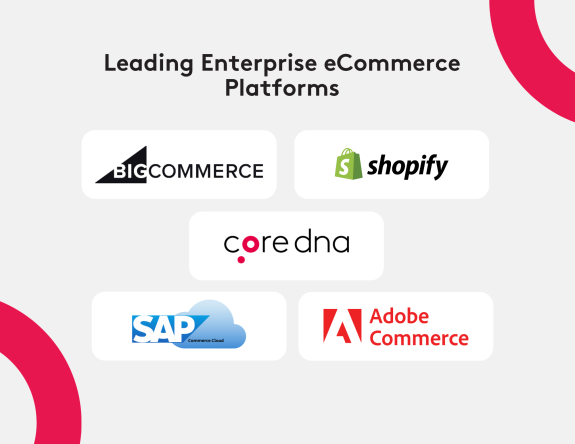
2025 Leading Enterprise eCommerce Platforms
As online sales continue to dominate consumer habits, more and more providers have stepped in to offer eCommerce solutions. A few companies have already established themselves as leaders in this sphere, especially for enterprise-level eCommerce.
Core dna has been a trusted enterprise ecommerce and CMS SaaS platform. it offers a unified digital experience ecosystem that includes eCommerce, CMS and automation solutions.
Core dna provides customization and support for large eCommerce businesses. This helps them create an eCommerce experience that suits their needs rather than the other way around.
It's about giving small tech teams access to big tech results. Core dna's eCommerce platform is not just a software. It's offers managed services to ensure all clients have access to IT management and support.
The advanced Core dna support team focuses on giving enterprise clients access to technical expertise and knowledge. This way they an feel empowered even without an internal IT department.
Shopify has been a big name in the eCommerce world. In recent years it has expanded its offering to include Shopify enterprise. This new offering offers large eCommerce businesses unlimited access to API calls and number of seats.
BigCommerce Enterprise and SAP Commerce Cloud are similar providers offering large-scale solutions for business with high-volume sales.
Meanwhile, familiar names in business software have expanded their offerings for online retail platforms as well. Salesforce now provides Salesforce Commerce Cloud as a cloud-based suite of products for enterprise eCommerce sites. Another familiar name, Adobe, offers Adobe Commerce for enterprise customers.
Interestingly, the underlying architecture for Adobe’s platform — branded as Magento — is open-source software. It allows others to download and modify the code to build their own, custom platforms.
Open-source platforms require a strong developer knowledge and large team to maintain. They are best suited for technically mature eCommerce businesses.
Top 6 eCommerce Platforms Comparison
Although reputable enterprise-level eCommerce providers offer customization within their platforms, there are advantages and limitations among their respective solutions. When choosing a provider, be sure to weigh the pros and cons of their offerings:
Provider | Pros | Cons |
Core dna |
|
|
Shopify Plus |
|
|
BigCommerce Enterprise |
|
|
SAP Commerce Cloud |
| |
Salesforce Commerce Cloud |
|
|
Adobe Commerce (Magento) |
|
|
Emerging Trends in Enterprise eCommerce platforms
As businesses demand greater eCommerce platform scalability, customization, and overall functionality, providers are offering more innovations solutions. Here are a few trends that are catching on among leading cloud-based eCommerce platforms:
- Headless Commerce: Headless Commerce is a platform that operates the back end of a website separately from the front end. This allows a site to load faster and respond more dynamically to users or market variables without requiring developer input on the back end.
- AI and Personalization: AI's impact on eCommerce is unprecedented. AI-powered tools help businesses create highly personalized experiences. They use trends, customer profiles, and real-time behavior on eCommerce sites to tailor the offering. This will give eCommerce stores new avenues to increase conversion.
- Omnichannel Strategies: Omnichannel marketing strategies map out all the touchpoints of the user journey and optimize them for a unified experience. In eCommerce, omnichannel means that customers can shop across devices, channels and shop online pickup in store.
When looking at a scalable eCommerce solution, consider not only what your main page will look like, but also every facet of the UX.
2025 best eCommerce platforms will help you establish an easily identifiable brand identity across all channels. It will streamline all UIs for ease-of-use and generate personalized content for users leverage cutting-edge AI tools. All with minimal input or development from your in-house team.
Check-out our 2025 eCommerce trends article to get insights into all the trends that will shape the next few year.
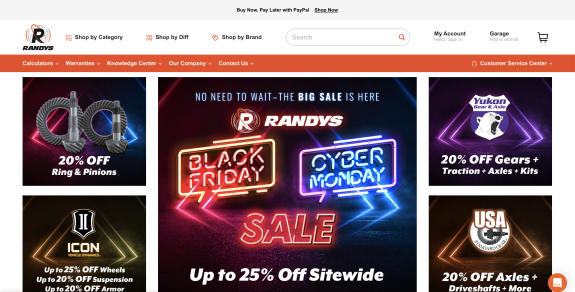
RANDYS Worldwide: B2B Enterprise eCommerce Success Story
To understand the benefits of upgrading to an enterprise eCommerce solution, we can look at a real example. This example is RANDYS Worldwide.
RANDYS Worldwide is a 40 million dollars manufacturing and wholesale business. They launched their first eCommerce website on Wordpress and WooCommerce. This combination quickly showed its limit given the specific needs RANDYS had.
RANDYS' needs:
- A b2b portal to interact with clients
- Ability to create quotes and give payment options reflecting contract agreements
- An extensive and detailed search for the large product catalog
- Integration with ERP and PDM
- Scalability to add new websites and brands with central management
The WordPress site was clunky and effectively non-functional. The sales team found itself relying on phone orders, turning away untold numbers of customers in the digital age.
RANDYS Worldwide was in need of a platform that could help them grow and streamline their online operations. With the acquisition of 7 new brands, RANDYS needed to move offline, 1to1 sales to an online system for exponential growth.

RANDYS turned to Core dna for an eCommerce platform that integrated B2B solutions and helped them scale all their brand online.
Core dna b2b eCommerce platform offered personalized b2b portals, extensive elastic search and multi-site management. The platform created an ecosystem approach by integrating all the tech stack of the business for a comprehensive online experience.
RANDYS now sports all the modern capabilities of an enterprise eCommerce platform.
To learn more on how Core dna helped RANDYS Worldwide create a custom eCommerce solution, read the case study here.
Considerations When Selecting an Enterprise eCommerce Platform
When selecting an enterprise eCommerce platform, look beyond features and understand the partnership that will be in place.
A platform that offers strong support will invest in your success as much as you do.
Evaluating the time and cost of the migration is also an important aspect to keep in mind.
Ultimately, this boils down to three considerations for businesses:
Total Cost of Ownership
Calculate the upfront cost of migration, and then factor in recurrent charges to continue using the platform.
Providers should help you calculate these costs, and if they offer a flat subscription free, that’s especially helpful for reliable, transparent budgeting in the long term.
Implementation Timeframes
It takes time to migrate data and help businesses create custom solutions. The process, from conception and goal-setting to final implementation, can takes months at the enterprise level. Devise a plan with your provider and any support partners to ensure you have a timeframe that works for you.
Vendor support and Community
Depending on the provider’s level of support, a business may be left on their own to navigate the platform after implementation, or they may receive ongoing and personalized support throughout the partnership.
Make sure you have the support you need, either through the provider itself or the community of developers under the umbrella of that eCommerce platform.
Also keep in mind that some eCommerce platforms are geared towards a specific business model. If you’re looking for a B2B eCommerce platform, for example, you’ll be missing a lot of functionality from a platform that’s traditionally catered for B2C or D2C.
Alternatively, if you want a solution that works equally well across all three business models, then make sure your provider has experience with all environments and offers a full range of functionality.
In fact, an increasing number of B2B eCommerce companies are diversifying their audience, targeting customers directly alongside B2B supply chains.
This hybrid eCommerce model businesses to expand their offerings and customer base, but it requires a sophisticated platform that accounts for both markets.
The Future of Enterprise-level eCommerce
To stay competitive in a digital landscape that is constantly evolving and changing, large businesses should invest in flexible eCommerce platforms that grow and scale with them.
Understanding your needs and having a growth vision will help you choose and adaptable platform that can be your ally in building an eCommerce empire.
We all know that AI and omnichannel experience will be even more dominant in the future. Customers want to be able to switch devices and location seamlessly and still have all their history. To achieve this, enterprise-level eCommerce should embrace the integrative approach in business - From stores to amazon alexa.
Forbes noted some of the most impactful emergent technologies will play a role in the future of eCommerce, including AI and machine learning (ML), blockchain, and augmented reality.
Sure enough, technologies like AI- and ML-powered tools have practically taken over eCommerce innovation. Developers are still discovering the capabilities of blockchain and augmented reality for online sales and marketing.
Meanwhile, other emergent technologies are gaining traction: chatbots, company-specific mobile apps, recommendation engines, and integrated commerce on social media apps.
When you adopt an enterprise eCommerce platform, make sure that your provider understands these trends, how they can be leveraged for your business. Choose a platform that can offer extensive integrations capabilities to help create a cohesive ecosystem.
As we look toward the future of eCommerce, there’s little doubt that the market will slow down. The International Trade Administration predicts that global B2B eCommerce will grow at a 14.5% compound annual rate through 2026, with a similar projection for B2C eCommerce.
And while China and the U.S. continue to dominate the global market share, other countries’ eCommerce markets are growing at a faster rate: India and Brazil will see more than 14% growth annually, with Argentina and Turkey close behind.
Clearly, the market is becoming ever more diversified in region and offerings, and eCommerce platforms will need to cater to a global audience while working with (and against) other global companies.


